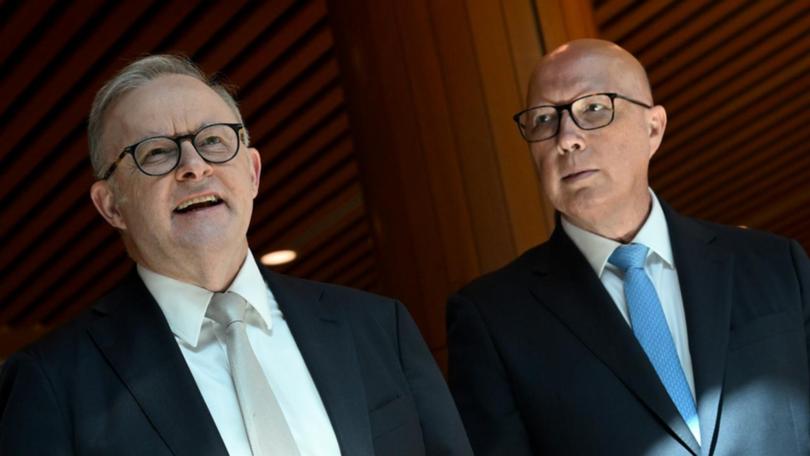Federal election: Experts say Labor still 'in box seat' despite latest poll results showing Liberal in the lead
The latest opinion polling shows the coalition leads the Government, but experts say Labor is still on track to be re-elected at the next federal poll.

The coalition is consolidating its popularity with voters, but political pundits believe Labor is still in a prime position to form Government at the next federal election.
The latest Newspoll, released on Monday, showed the coalition leading 51 per cent to 49 per cent, on a two-party preferred basis, the same result as the previous poll.
The survey found the coalition also increased its primary vote by two points to 40 per cent, while Labor boosted its vote from 31 to 33 per cent.
Sign up to The Nightly's newsletters.
Get the first look at the digital newspaper, curated daily stories and breaking headlines delivered to your inbox.
By continuing you agree to our Terms and Privacy Policy.Monash University politics lecturer Zareh Ghazarian said while the coalition was ahead in the polls, it would not be enough for the opposition to form government.
“At the moment, it’s looking as though the coalition has consolidated its position as the force most likely to get a majority of the two-party preferred vote,” he told AAP.
“It’s probably not enough (for) where the coalition needs to be to be within a majority.
“The major parties are attracting support, but none ... are in a strong position to win a majority of seats.”
The next election is due to be held by May, with predictions of a hung parliament.
Labor currently holds 78 seats to the coalition’s 55, with 76 needed for a party to govern in its own right.
“If the Newspoll is replicated on election day, Labor is still in the box seat to form minority government. They would still have a higher number of seats than the coalition,” Dr Ghazarian said.
“First-term governments can lose support really quickly, but the challenge with the Albanese government is that it came into government in a weak position with a small majority, so it doesn’t have the luxury of losing support.”
Opposition Leader Peter Dutton’s approval rating rose two points to 40 per cent, equal with Prime Minister Anthony Albanese.
Disapproval of Mr Dutton’s performance was 51 per cent, while dissatisfaction with the prime minister worsened by one point to 55 per cent, leaving Mr Dutton on minus 11 and Mr Albanese on minus 15.
In a head-to-head comparison, Mr Albanese remains the preferred prime minister with the support of 45 per cent, while Mr Dutton is at 41 per cent - a rise of four points for the opposition leader since the previous Newspoll.
Following the US election, where Donald Trump made a comeback victory to the White House campaigning on cost-of-living pressures, poll watchers speculated whether a similar strategy would pay dividends for Mr Dutton.

The opposition leader said economic issues would factor in the coalition’s campaigning.
“People will be asking themselves a question - and it’s a reasonable question to ask - are you better off today than you were at the time that Mr Albanese was elected?” he told reporters on Sunday.
“What the government’s demonstrated over the last two-and-a-half years is that they’ve just got all the wrong priorities.”
Defence Industry Minister Pat Conroy said the government would be campaigning hard on cost-of-living measures.
“The Australian public understands we’re doing all that we can to help with cost-of-living relief. People are doing it tough now, and it’s important to acknowledge that,” he told ABC Radio on Monday.
A Resolve Political Monitor poll, also published on Monday, surveyed Australian attitudes following the US election, with 44 per cent agreeing Australia should now forge closer ties with other nations in the region, including China, compared to 19 per cent who disagreed.
Almost two in three respondents thought Australia shouldn’t take sides in a conflict between the US and China.
Former Labor prime minister Paul Keating seized on the figures to pressure the Albanese government to shake up its military reliance on the US as he criticised the stationing of American assets in Australia.
“These weapons, in all likelihood, would be central to any military exchange between the United States and China in the region,” he said.
